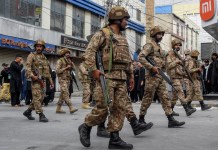Will Japan-North Korea bilateral diplomatic relations be normalised which can bring peace to the region? Japanese PM Shinzo Abe vowed to meet his North Korean counterpart Kim Jong Un to resolve mutual distrust and restore diplomatic ties between Japan and North Korea regarded as historic foes.
In a major policy speech to mark the opening of Parliament yesterday, Mr Abe also vowed to push Sino-Japan ties “to a new stage” and pledged a record budget to improve crumbling infrastructure in the world’s third-biggest economy.
“I will act resolutely, never failing to seize every opportunity to break the shell of mutual distrust, and I myself will directly face Chairman Kim Jong Un to resolve North Korea’s nuclear and missile issues, as well as the abduction issue,” Abe said.
The abduction of Japanese citizens by North Korea in the 1970s and 1980s remains a highly emotive issue for Japan.
Mr Abe gave no timeframe for a potential meeting with the North Korean leader but the comments came as Mr Kim ordered preparation for a second summit with US President Donald Trump, likely towards the end of next month.
“I will aim at diplomatic normalisation by settling the unfortunate past,” Mr Abe said, using a Japanese diplomatic euphemism referring to harm caused by Japan during its brutal colonisation of the Korean peninsula before and during World War II.
North Korea has given no public indication of any willingness to meet Mr Abe, while Pyongyang’s state media regularly excoriates Japan over its past history and Mr Abe for ramping up defence spending.
On China, Mr Abe said ties had “completely returned to a normal path” after he visited President Xi Jingping in Beijing last year. Mr Xi is expected to make his first official visit to Japan this year.
Bilateral ties were harmed in 2012 when Tokyo “nationalised” disputed islands in the East China Sea also claimed by Beijing. Until recently, neither nation had made much effort to repair relations.
But Japan’s business community has long urged Mr Abe to improve ties with China, Tokyo’s largest trade partner as well as the biggest source of foreign tourists, who are collectively becoming a key driver of the country’s chronically fragile economy. Tokyo believes a successful visit by Mr Xi is key to a productive Group of 20 meeting, which Japan hosts this year, and hopes the Chinese leader will attend the 2020 Olympic Games.
Mr Abe was cautious about Russia, amid a territorial row over tiny islands to Japan’s north that has proved difficult to resolve despite frequent meetings with President Vladimir Putin.
He also pledged a whopping seven trillion yen (S$86.6 billion) on infrastructure spending, as the nation’s many roads and bridges become dilapidated and Japan routinely faces serious natural disasters such as flooding and earthquakes.
More News at EurAsian Times
- Indian Military Base in Vietnam To Protect Hanoi’s Territorial Interest
- Indian Military Base in Sabang can Strangle China at the Strait of Malacca
- Saudi Money, US Weapons, Israeli Intelligence Fuelling Arab NATO – Iran
- Will Ayni Airbase in Tajikistan Become India’s 1st Overseas Military Base?
- Indonesia Opens Another Military Base at Natuna Islands To Counter Aggressive China




